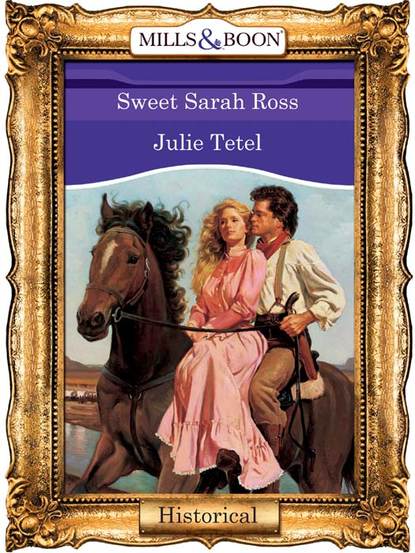По всем вопросам обращайтесь на: info@litportal.ru
(©) 2003-2024.
✖
Sweet Sarah Ross
Настройки чтения
Размер шрифта
Высота строк
Поля
He climbed back out of the wagon nearest her, jumped down on the ground. “Nothing,” he reported. “Not a pot or pan or sack of flour to be found.” He walked over to her. “Don’t feel bad about being happy your family isn’t among the slain, although it may feel odd to be so happy in the midst of this misery.”
She nodded and voiced her puzzlement about another matter. “Two others from this wagon are missing. You see, here are the Kelly brothers.” She gestured toward a trio of bodies. “They were traveling together and had left their aging parents behind in Ohio. Now, beyond the second wagon lie Mr. Clark and his grown son Jack, but Mrs. Clark and her daughter aren’t there. I’m wondering whether they might have escaped.”
“Possibly.”
“Which means they might be roaming the hills,” she said. “Perhaps we should look for them.”
“They might have been captured,” Powell replied. “Or they might be lying dead yonder, out of our sight.”
“Still, I’m wondering why it is only the men who have been killed outright, and none of the women.”
Powell walked around the large dispersed triangle that was formed by the Kelly brothers, studied the sprawled attitudes of the dead bodies. “Do you know whether all three were carrying firearms?”
“I would suppose they did. Every man on the wagon train had a rifle, sometimes two. Why, even Morgan—my father—had a rifle for shooting game.”
“Judging from the way these bodies lie, and adding the Widower Reynolds into the equation, I would say that those who were killed outright were the ones doing the shooting. From the placement of their arms and hands, it looks as if each one was holding a rifle that was subsequently taken.”
“You must have had a rifle when you were captured, no? Why didn’t they kill you outright?”
“My rifle was on my back,” he said, “and I wasn’t shooting at them. At the time I was sorry to be so defenseless, but perhaps not anymore.”
“They were going to kill you anyway,” she observed, “and I don’t like to think of Mrs. Clark and her daughter facing unspeakable torture. I doubt the two of them would be able to escape the way you did.”
“How old is the daughter?”
“About ten.”
He considered the matter. “The Teton Sioux might currently have a shortage of women. A ten-year-old girl who could be taught their ways and a woman perhaps still of child-bearing age might be prized rather than killed.”
At that Sarah’s mind boggled. The phrase “Fate worse than death” drifted into consciousness but just as quickly drifted out. Her thoughts easily embraced the idea of her sisters, if captured, remaining alive, and her mother, too, but stumbled against the notion that they would be condemned to live an Indian life. Condemned? Her thoughts bumped uncomfortably into the image of her father, Morgan, and her brother, Laurence—that is, her stepfather, Morgan, and her stepbrother, Laurence, child of Morgan’s first marriage to an Iroquois woman.
Laurence had lived with them since Sarah was a baby, but he had left the Maryland farm already thirteen years ago. Sarah had always been in awe of the remarkable Laurence Harris, who was fifteen years her senior, and she had always been angry at anyone who might have called him half-breed behind his back.
At the same time, she had always been…well, not ashamed of his Indian heritage and the life that Morgan had lived before he had married her mother, but maybe rather confused by it. Or alienated by their background, which had so little in common with hers, and conflicted with hers. Their background was a complication in her life, another strike against her, although few people had ever dared refer to her own background or the disadvantages it had brought her. She had sometimes felt like a stranger in her own country, in her own family. And she had been there first—before Morgan or Laurence or her bratty half sisters!
“You said that even your father had a rifle. What did you mean by that?”
Sarah’s tangled musings were cut short. “Only that he’s a peaceable man and wouldn’t shoot at another person.”
She waited for the retort, “Not even at an Indian?” But it didn’t come. Instead Powell said, “All right, then. One wagon remains back at the original site and one body. Two more are here, five bodies, minus two women. The other six wagons—”
“Seven,” she corrected. “We were ten in all.”
Powell paused, then said, “I must have miscounted the tracks. In any case, the other wagons dispersed more to the north than the west. What I don’t know is how many warriors descended on your wagon train and how many were spread out looking for me in other parts of the territory. Covered wagons move a lot slower than horses, so in order to get away, the men in those wagons must have killed some of their attackers. I can’t be sure of the number, of course, because those bodies would have been long since returned to their villages by their tribesmen to be given a proper burial.”
“We don’t know that all of the seven other wagons escaped in the end, do we?”
“No, but they made it at least two or three miles, which is a rough estimate of the distance I could reckon from the wagon site.”
“So which way do we go now?”
He pointed in the northwesterly direction they would travel for the night. “It will be slow going to put the complete puzzle together, but with luck we’ll have it solved in the next day or two.”
“Speaking of proper burials, do you think we should do something about—” She broke off and gestured vaguely about her.
He shook his head. “No good reason to advertise that anyone has been through this territory, which is what we’d be doing if we buried the bodies but didn’t dispose of the wagon wrecks.”
She saw the wisdom in that.
“And we don’t have any shovels.”
“True enough,” she agreed. “Then you might wish to choose a pair of trousers that fits you better.”
Powell nodded. When he began to walk around the bodies, sizing them up for the best fit, she looked away from the scene and out over the darkened infinity stretching before her, trying to keep fearsome thoughts at bay. She asked quietly, “Do you think we should take another pair of trousers, just in case?”
He didn’t immediately respond to that, which made her think he hadn’t heard her, but when he came up behind her several minutes later, he said, “I’d like to, but I don’t want to have to dispose of another body.”
She turned and saw that he was fully dressed. White shirt, torn and bloodied over the left breast. Trousers that fit. Leather suspenders. A pair of boots laced together and slung over his shoulder. She glanced around and saw the body that had been stripped down to long Johns, the arrow still sticking straight up from the heart.
“I see what you mean,” she said. “We can hardly leave him out in the open, can we?”
“I’m thinking of dragging him into the wagon. If any Sioux pass by here and bother to inspect the wagon, they might think he got caught sleeping. We’ll leave the other bodies the way they are. As much as their boot laces would be useful to us, I won’t risk taking them.”
Together they dragged the stripped-down body into the nearest wagon and dressed it in the ill-fitting trousers Powell had cast off along with the Widower Reynolds’s suspenders. When she was climbing out again, her eye was attracted by a flash of moonlight caught in some small object that was lodged under the wheel of the other wagon. When she bent down to inspect it, she was delighted to discover a new-fangled tiltedged razor.
She held up the miraculous object. “Look, Mr. Powell. I have found a tool perhaps even more useful than my scissors. Why, I’m sure you could put this to use as a fine weapon.”
Powell approached her and ran his hand over his chin and neck. “I think it’ll make a better razor than weapon, and I can certainly use that.”
Annoyed, once again, by the way he seemed to have put her in the wrong, she handed him the precious object, saying pleasantly, “How sorry I am, Mr. Powell, that I didn’t discover a comb and a brush beneath the wheel, since we are apparently not in dire need of weapons. It seems that I am not to be credited with any good ideas—not that I am expecting a thank-you!”
He had the grace to smile, and the harsh lines of his face were transformed into a surprisingly attractive arrangement. She dismissed this unexpected effect as a trick of the moonlight.
“Your excellent find of the razor, Miss Harris, will be useful in a variety of ways, and allow me to compliment you on your suggestion that I choose a better-fitting pair of trousers. It was, perhaps, your first good and useful idea,” he said with a slight bow, “but I am confident that it will not be your last.”
“It was my second,” she corrected. “Remember that I had the idea to bring you the first pair of trousers last night, although I suppose you’ll only say now that in taking the Widower Reynolds’s clothing, I have left evidence that white folk have come through the area.”
“I wasn’t going to say anything of the kind, Miss Harris,” he said. He picked up the petticoat sack, tied it around the boots hanging over his shoulder so that the ends of the cloth were balanced front and back, and struck out in the direction that he had earlier indicated they would take for the night.
Sarah had no choice but to follow him.
After what seemed to be several miles of walking, they came upon what Powell identified as the tracks from several of the fleeing wagons of the day before. They strained to find signs of wreckage or dead bodies but saw nothing. They were inclined to take it as a good sign.
They followed the tracks, although they had no assurance that the ruts had been made by her family’s wagon. The moon rose. They walked. The moon traversed the sky. They walked. And walked until she could feel every step through her soles to the muscles of her calves and thighs and back. To take her mind off her aches and hunger and thirst, she fixed her thoughts on an image of Morgan Harris confronting his Sioux attackers without raising his rifle to them. In her vision the Widower Reynolds fell to the ground. So did the Kelly brothers. Mr. Clark and Jack, too. But Morgan remained standing.
Chapter Four (#ulink_6b5719c4-e826-5e7a-ae08-5ef75e90a18f)
When the night gave a hint of surrendering to a new day, Powell stopped at a small tree-filled hollow he had found tucked in the shadows of the barren plains. Sarah’s leaden spirits lightened at the sight of a spring lazing in the middle of the hollow and ringed by rocks glowing white in the moonlight. Her thirst was stronger than her exhaustion, so she slipped down the rocky slope to splash her face and drink her fill. When she returned to what would be their campsite, Powell had heaped several arm-fuls of leaves beneath a tree, spread the half petticoat out upon them and offered her a bed. Without waiting for her thanks, he began to fashion his own bed of leaves about ten feet away from her.





